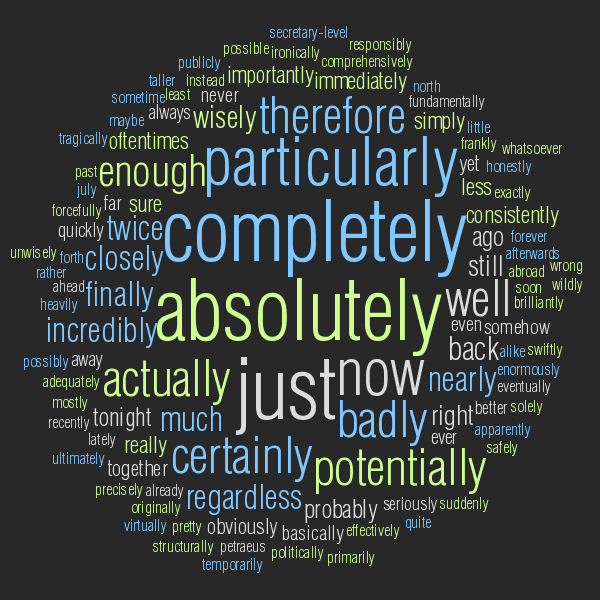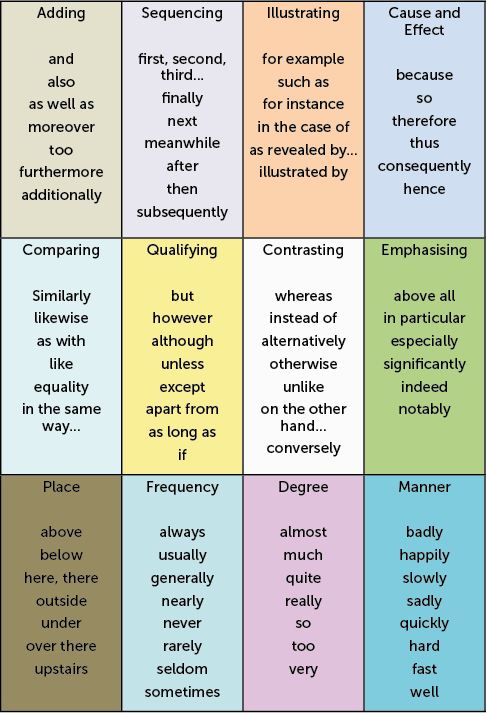
English adverbs
If you think you already know your English adverbs from your adjectives, skip straight to the quiz – otherwise learn more about this handy language construct with Phil Stoneman’s guide.
Fortunately, I quite like using English adverbs and always use them as often as possible when I talk both casually and formally.
Can you identify the types of words in the sentence above? We have pronouns, verbs, nouns and connectors which are easy to recognise. But what about adverbs? In this sentence, we have fortunately, quite, always, as often as possible, casually and formally. Adverbs can be hard to identify as they do many different things, but they are an important part of English, and being able to use them well will really make a difference to your language skills.
Let’s take a look at some of the types of adverbs:
Adverbs of frequency
These are usually the first adverbs you study in English, and tell you how often something is done: never, rarely, occasionally, sometimes, usually, and always. Remember that the adverb needs to go before the main verb, unless the main verb is to be, when the adverb goes after it:
We always meet at university.
He is sometimes late for class.
Let’s see how you use adverbs – put the adverbs made from the words in brackets into the correct place in the sentences below. Answers below.1. We are hungry before 12pm. (rare) |
Adverbs of manner
These are called adverbs of manner because they describe how we do something. Because of this, they always work with a verb. They usually go after the main verb or verb phrase:
I walked slowly down the hall.
He always does his work carefully.
These adverbs can usually be recognised because they end in ‘–ly’, which is the English version of ‘-mente’, but be careful! Not every word ending in ‘–ly’ is an adverb. For example, here are two common adjectives which also end in this way:
She lives in a lovely town where everyone is so friendly.
And not all adverbs have this ending! In the sentence below, the first “fast” is an adjective, which describes a noun (the car), and the second one is an adverb, which describes the action (how he drives):
He has a fast car, and always drives very fast.
Hard is another adverb which is the same as its corresponding adjective:
It’s hard to beat her because she always plays so hard.
Fortunately, most adverbs do use the ‘–ly’ ending, so they are easy to recognise. Remember as well that we use some ‘–ly’ endings in English where you don’t use the ‘–mente’ ending in Spanish. For example, you need to say “the children were sleeping comfortably.”
These adverbs are extremely useful to use, for example in descriptive writing. Don’t just say what the action is, say how it is! In the last conversation you had, how were you talking?

A selection of different adverb types.
Adverbial phrases
Just as we can use an adverb to give additional information, we can use whole phrases that also do this job. For example, to describe how someone talks, we can use an adverb:
He talks quietly.
We can also use adverbial phrases instead of the adverb to describe the action:
He talks in a whisper.
He talks like he owns the company.
Modifiers: to intensify and soften
Adverbs are not only used with verbs, but also with adjectives. A very useful type of adverb is the modifier. Adverbs like so, very, vastly, or massively can be used to strengthen an adjective:
Chia is such a small town. Bogotá is a vastly different place.
However, it’s very important to also recognise that this type of adverb is often used by native speakers in the opposite way: to make something that sounds very strong more polite:
Could you change this fork, please? It’s rather dirty.
I wanted to rest because I was quite tired.
Adjuncts, disjuncts & conjuncts, oh my!
Most adverbs are adjuncts: they are part of a sentence, and don’t need any special punctuation to introduce them. However, disjuncts and conjuncts are a little different, and use commas to introduce themselves. Disjuncts often comment on the whole sentence, and are used at the beginning:
Honestly, I don’t know what he was thinking!
Unfortunately, I’ll have to work this weekend.
Conjuncts are more like connectors, and help us to follow the direction of ideas:
If we win the match, then we’ll celebrate tonight.
Many people like cats. However, I prefer dogs.
Finally, you can see that adverbs are generally used for a variety of things. Fortunately, they’re not too hard to understand, and they’re rather useful, so add them carefully to your English!
Answers:1. We are rarely hungry before 12pm. |
Originally from Sheffield, England, Phil Stoneman has been living in Bogotá and teaching English since 2004. He both teaches at and is part of the English coordination team at Externado University.




